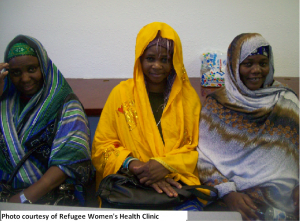 The U.S. accepted more than 73,000 new refugee arrivals in fiscal year 2010, 47.3% of these new arrivals were female.[1] Refugee women represent a vulnerable group who have been involuntarily displaced, are survivors of human rights abuses, and need special attention and care. Pre- and post-resettlement experiences of forced migration can have profound effects on women’s reproductive health as refugee women are more likely to experience delays in accessing health services and face disparities in reproductive health outcomes. Nevertheless, throughout their journey, refugee women exhibit extraordinary resiliency and strength.
The U.S. accepted more than 73,000 new refugee arrivals in fiscal year 2010, 47.3% of these new arrivals were female.[1] Refugee women represent a vulnerable group who have been involuntarily displaced, are survivors of human rights abuses, and need special attention and care. Pre- and post-resettlement experiences of forced migration can have profound effects on women’s reproductive health as refugee women are more likely to experience delays in accessing health services and face disparities in reproductive health outcomes. Nevertheless, throughout their journey, refugee women exhibit extraordinary resiliency and strength.
During the process of resettlement, women may face tremendous stressors including accessing English-language training, finding employment opportunities, and securing transportation, housing, and their children’s education. Other stressors include the woman’s changing role within the traditional family context and loss of traditional social support networks. As a result, women’s unmet reproductive health care needs may go unaddressed.
Access to culturally sensitive care and support is crucial throughout the spectrum of a woman’s life. This includes care during pregnancy and childbirth as well as family planning counseling, interconception care, screening for gender-based violence and sexually transmitted infections, preventive health services (including cervical and breast cancer screenings), and monitoring for emerging chronic disease. Health providers should be attuned to any traditional cultural practices that may influence reproductive health outcomes in order to provide services that meet the unique health care needs of refugee women.
Health policy directives aimed towards improving quality of care, decreasing health care costs, and promoting women’s reproductive health and wellness should consider both the social determinants of health responsible for health inequities and the influence of culture and acculturation processes.
Learn More:
Contributed by Crista Johnson-Agbakwu, M.D., M.Sc., F.A.C.O.G.
[1] Proposed Refugee Admissions for Fiscal Year 2012 Report to the Congress, Refugee Resettlement Program, Office of Refugee Resettlement, U.S. Department of Health and Human Services.
